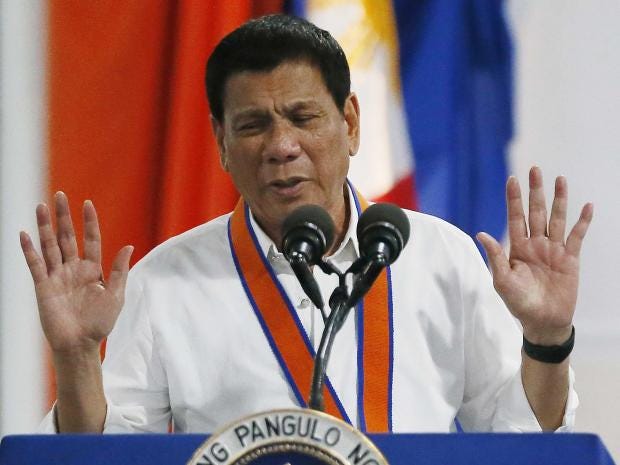MANILA, Philippines - Philippine President Rodrigo Duterte declared a unilateral cease-fire with communist guerrillas effective immediately Monday and asked the rebels to do the same to end decades of deadly fighting and foster the resumption of peace talks.
In his first state of the nation address before Congress, Duterte said he wanted a "permanent and lasting peace" before the end of his six-year term, which commenced on June 30. The ex-city mayor, who built a name for his tough, crime-busting style, also focused on his battle against illegal drugs, threatening drug dealers anew with death.
Addressing the New People's Army guerrillas, Duterte said: "Let us end these decades of ambuscades and skirmishes. We are going nowhere and it is getting bloodier by the day."
"Let me make this appeal to you," he said. "If we cannot as yet love one another, then in God's name, let us not hate each other too much."
The communist guerrillas welcomed Duterte's move and said they would wait for a copy of his truce order before "reciprocating positively."
"We share his desire to achieve a just and lasting peace," chief rebel negotiator Luis Jalandoni told The Associated Press by telephone from the Dutch city of Utrecht, where he and other rebel leaders have been on self-exile for years.
The guerrillas were waiting for Duterte's government to free the first 22 of hundreds of what they regard as political detainees who would serve as rebel consultants in the resumption of peace talks in the Norwegian capital of Oslo from Aug. 20 to 27, Jalandoni said.
Among those to be freed were top rebel couple Benito and Wilma Tiamzon, who were captured by government forces in 2014, he said.
The Philippine military also welcomed Duterte's announcement, but said it "will remain alert, vigilant and ready to defend itself and pursue attackers if confronted by armed elements of the New People's Army."
"The commander in chief has initiated a very bold move and we fully support him in his effort to bring sustainable and lasting peace," said military spokesman Brig. Gen. Restituto Padilla.
The decades-long communist insurgency, one of Asia's longest, has left about 150,000 combatants and civilians dead since it broke out in the late 1960s. It also has stalled economic development, especially in the countryside, where the Maoist insurgents have had an active presence.
Under Duterte's predecessor, Benigno Aquino III, peace negotiations with the communists that were brokered by Norway stalled over the government's rejection of a rebel demand for the release of captured insurgents. But Duterte, 71, who describes himself as a socialist, had given concessions to the rebels and designated left-wing activists to at least two Cabinet posts.
The rapport he had built with the political left was evident outside the House of Representatives complex, where Duterte delivered his nationally televised speech. Instead of the violent confrontations between riot police and left-wing protesters that have taken place in the past, activists were allowed to camp outside the congressional complex and policemen were seen greeting and giving them juice drinks.
"This is a refreshing development," protest leader Renato Reyes said. "What's new with this president is he's ready to dialogue with the people and he does not hide behind container vans, barbed wires and thousands of anti-riot policemen."
The rebels have also praised Duterte's critical stance on the security policy of the United States, which has blacklisted the communist insurgents as terrorists for its bloody attacks, including an ambush that killed a U.S. Army colonel near Manila in 1989.
Government negotiators have met with rebel counterparts and agreed to restart peace talks soon. Jose Maria Sison, a rebel leader in self-exile in Europe, plans to fly home to meet Duterte, his former student at a Manila university.
Duterte also said his administration was ready to pursue peace talks with Muslim guerrillas in the country's south, where he was a longtime mayor of Davao city and built a name for his tough style before rising to the presidency.
"Let me say this, all of us want peace," Duterte said. "Not the peace of the dead, but the peace of the living."
While extending the hand of peace to the Muslim insurgents, Duterte had a more hard-line stance on Abu Sayyaf extremists, who have been blamed for local and cross-border kidnappings of Malaysian and Indonesians in the south. The military's might, he said, "will be applied to crush these criminals, who operate under the guise of religious fervor."
Duterte's warning to drug dealers and rogue officials and policemen was harsh.
"We will not stop until the last drug lord, the last financier and the last pusher have surrendered or been put behind bars or below the ground if they so wish," he said, drawing applause.
Since Duterte rose to the presidency, nearly 300 suspected drug dealers and users have been killed in reported gunbattles with police and in still-unexplained deaths while more than 129,750 others have been arrested, according to police. Human rights groups have been alarmed by the scale of drugs killings and criticized Duterte for not taking steps to stop it.
"As long as President Duterte turns a blind eye to — or implicitly or explicitly encourages — summary killings, the fundamental right to life of all Filipinos is at risk from potentially random extrajudicial violence," said Phelim Kine, deputy director in Asia of the U.S.-based watchdog Human Rights Watch.


No comments:
Post a Comment